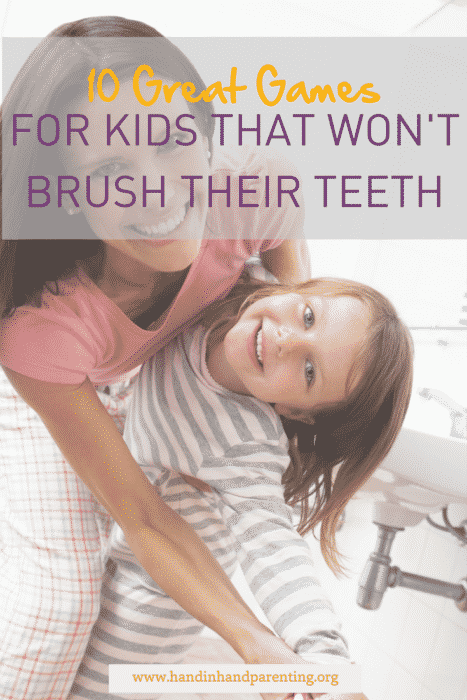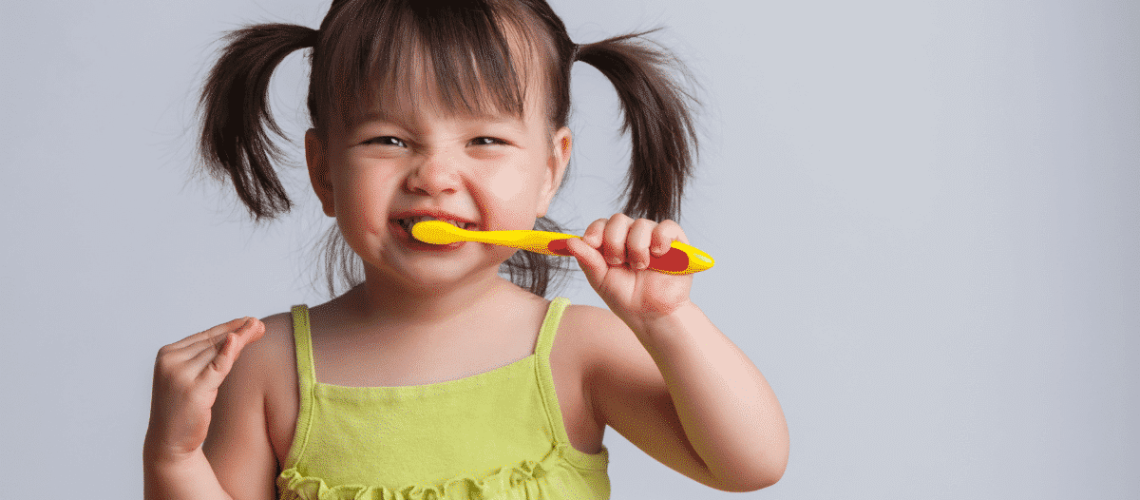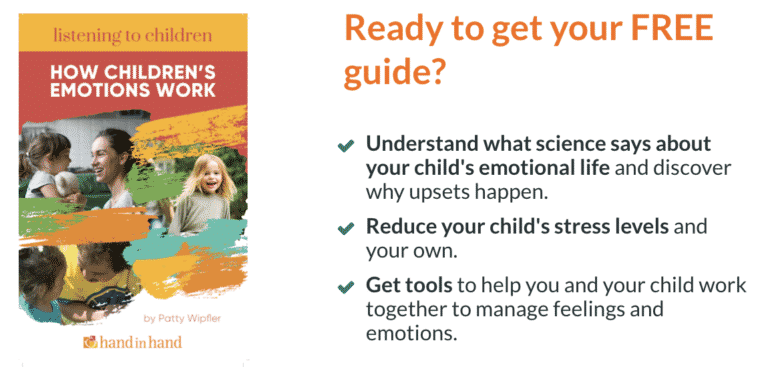They say “choose your battles wisely,” and getting teeth brushed in most houses is one many of us struggle with. But with up to 530 million children with poor dental health worldwide, according to the World Health Organization, this is one fight that we can't ignore.
Getting teeth clean doesn't have to mean daily yelling, bribing or forced brushing, because, guess what?
Play is a surprisingly effective way to make it happen.
Why Do Kids Hate Brushing Their Teeth?
There could be numerous reasons why kids dislike brushing their teeth. Some might feel invaded by the prod of the toothbrush, or shy away from the taste of toothpaste.
Others don't feel like carrying out yet another order on the nightly list: take a bath, get changed, choose a book. (Or maybe they just want to choose the book and snuggle up).
Night time itself can present problems for kids.
Think about it: Long hours of alone time. In the dark. Monsters. Nightmares. Bed-wetting.
It's easy to see why children might view brushing teeth as just another step towards nighttime doom and gloom.
Often kids may choose teeth-brushing as a pretext to clear feelings that have built up during the day. It gives them a good opportunity to fight you, cry, get upset, and, if you can remain calm and listen, offload all the feelings they've been collecting.
>Want to know more about kids, emotions and tantrums? Get this free guide and decode your child's emotions.
Many kids resist simply because they don't understand a parent's concern for teeth to be clean.
This is why teeth-brushing rates so high on the list of common parenting challenges. Many families struggle to get their child even near the sink, others run as soon as they get there, while other kids will clench their mouths against the brush.
These scenarios play out in many bathrooms daily, and they lead parents to a full stop.
As tensions mount, morning after morning, night after night, even the idea of teeth-brushing becomes a chore.
What now? We ask. Should we bother?
Or we force: “Let's just get this done now.”
It's uncommon, unless you had a very playful or easy-going parent, to default to a playful response.
But it helps! Try play and watch your battles around brushing teeth become more about laughter and connections.
Take Tooth-Brush Time from Tantrums To Laughter
We don't need to know why a child resists tooth-brushing but we do need to keep teeth clean.
Using laughter and play bridges a child's resistance using your child's best language. Here's why.
When you get laughter going it helps to release tensions around a certain issue. Watch this video about using play to brush teeth. Laughter also helps children feel close and connected to us, which in turn helps their minds function well. It helps dissolves fear and anxiety around things, and build's a child's emotional safety and confidence.
Many parents using Hand in Hand's Playlistening tool, see big successes using play to take teeth-brushing from a time of tantrums to fun.
We're about to share some of their favorite games below, but before you skip to them, read the next section first. These are ideas about how to play when your child resists.
To get the best from this kind of play, there are a few guidelines.
Five Good Strategies To Use for Great Play and Great Teeth
Good play lifts the mood and helps puts kids in control, and works even better with these five strategies in place.
Get Close: A child running away from teeth-brushing is speaking to you in the best way they know how. They want you to connect first, which is why they may also say, “Chase me,” or “Catch me.” View the game as an opportunity to increase your connection not only as a way to get to teeth-brushing. Play for a decent while, follow your child's directions, and listen for their laughter. (See why, next).
Follow the Laughter: What may be funny to you, might not be to your child. If you try some of these games and they don't work, move through the list to the next idea. Follow your child's lead. If your child hides the toothbrush, for example, turn it into a game of “find the toothbrush.” Laughter and giggles show you that things are progressing well.
Play for Play: Plan on play taking some time. Try to enjoy the game. You may need to schedule some extra time because tooth-brushing like this moves from being a task to being a game. And kids love games! So schedule in the game (even start dinner early if your schedule allows).
Set a Limit When You Need To: If you play for a good while, you can set a limit on moving to teeth-brushing. If they still refuse, propose the limit. Hold your child close, look into their eyes, and simply say, “It's time to brush now.” You might offer to help, or ask them how they'd like it done. If they ask to play more take it as a sign that they love your closeness, and tell them they'll be time to play more tomorrow.
Get Committed: Kids do love play and they may revel in these times to begin with, so much so you might wonder how to stop. Promising regular play comforts a child and tells them they can trust that fun with you is a regular part of their days. If exhaustion sets in, or you don't feel like playing, you may be bumping up against a trigger or stressor. Try reading What If I'm Just Not A Playful Parent? and see if you can get back to being playful.
Top 10 Games To Help Tackle Teeth-Brushing Battles
Try these playful responses when your child fights against getting their teeth brushed.
 1 Brush Your Body: In this go-to game from Kristen Volk parents take the toothbrush, get in close and tells their child it's time to brush teeth. But then they pretend to scrub the child's ears / elbows / toes / nose until they say, “No! My teeth, my teeth!” and show you how.
1 Brush Your Body: In this go-to game from Kristen Volk parents take the toothbrush, get in close and tells their child it's time to brush teeth. But then they pretend to scrub the child's ears / elbows / toes / nose until they say, “No! My teeth, my teeth!” and show you how.
2 Where's the Dentist? Pick up a toothbrush and say, “Ew! I don't want to brush my teeth. I hope there's not a dentist around here that will make me,” and playfully look at your child. This play invitation offers a child the chance to brush your teeth. They love taking on the more powerful role and giving the direction.
3 Brush The Stuffies: Pretend to clean the mouths of all your child's favorite toys with humorful responses. Grumpy toys that spit, complain and throw the toothbrush away often bring out the giggles. They also show your child that he isn't the only one in the world who dislikes teeth-brushing. Offer your child a turn brushing a toy's teeth, and then ask which toy would like to brush your child's!
4 Super Silly Toothbrush: Tell your child it's time to brush teeth and reach for the toothbrush. Have it zoom and flip all over the place. Pretend you cannot get it near your child's face and try and force it. Have it skim a nose or a bare belly, inch past and ear or nose. Challenge your child to catch the toothbrush and help it do it's job.
5 Guess the Song: Hand in Hand parent Gail Bath has this great playful tip: Brush your own teeth while humming or singing a song and have your child guess it, and then throw open the challenge. What song will your child choose to sing while brushing? Warning: You might find you all brush multiple times!
6 Toothbrush Tales: Make your child's toothbrush the star of a goofy, adventure-packed story, says Kristen Volk, but only tell it when a child is brushing. Give the toothbrush a name and a voice and make Toothpaste, Floss or Mouthwash trusty sidekicks and give them a storyline. Trips to space? Super powers? Meeting princesses? Anything that gets a giggle.
7 What is This Thing? That's the question that instructor Roma Norriss asks her kids when they don't want to brush. She examines the brush, puzzled, and tries out various other uses. “A teeny tiny hairbrush?” “A too-big nostril scrubber?” When your child explains the real use, you can still ‘get it wrong,' by attempting to squeeze lemon juice, soap or tabasco on it.
8 Where is Your Toothbrush? Point at everything in the bathroom but the toothbrush and ask, “Where is your toothbrush?” says Hand in Hand parent Sapna Swaly. Take things further by actually hiding the toothbrush in some crazy places.
9 Get the Germies: Got a kid that loves shoot 'em up? Play ‘Get the Germies.' Challenge him to squash those tooth-decayers one by one, and narrate in real time his score. Do an overall check at the end and declare the final number.
10 Race to the Bathroom: Lots of Hand in Hand parents have success with a “race you to the bathroom,” game, and you can take it up a notch by inviting your child to help you create an obstacle race that you scramble through on the way to the bathroom (and maybe back to the bedroom) after tooth-brushing time is up.
Why Do Upsets Happen?
- Why do children happily do things one day, and then resist the next?
- Why does your child always lose it when you ask them to do certain things?
- What happens to your child's brain in meltdown, and how can you guide them through to calm and happiness?
Get answers to these questions and lots more in this free guide. Download it now.

 Download your guide now
Download your guide now